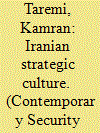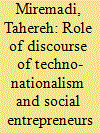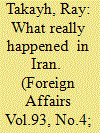|
|
|
Sort Order |
|
|
|
Items / Page
|
|
|
|
|
|
|
| Srl | Item |
| 1 |
ID:
129667


|
|
|
|
|
| Publication |
2014.
|
| Summary/Abstract |
This article attempts to deepen our understanding of how state ideology, as a component of strategic culture, influences the manner in which states approach the use of violence. In that context, it examines the influence of Shiite Islam on the way that post-revolutionary Iran has employed force in its own defence. It argues that the influence of religion on Iranian strategic culture has been extensive. Islam has largely shaped the regime's perceptions of international relations, as well as how Iran should relate to the outside world. It has resulted in a highly revisionist foreign policy which attempts to remake the world in its own image. This orientation has left Iran internationally isolated and driven it to rely as far as possible on its own resources for its defence. It has also inclined Iran to forge closer relations with Islamic movements in the Middle East to compensate for the lack of allies among states. Islam has also prompted the regime to adopt deterrence by denial as the cornerstone of its military strategy. This military strategy renounces the use of force for material gain and condones it only when employed for the defence of the homeland and the wider Muslim community. However, it is still willing to strike pre-emptively if need be and take the fight to the enemy should Iran be attacked. Islam has also led Iran to emphasize faith and fighting spirit, over numbers and technology as the determining factors in war because it perceives victory as a divine gift bestowed on those who fight for Allah.
|
|
|
|
|
|
|
|
|
|
|
|
|
|
|
|
| 2 |
ID:
124463


|
|
|
|
|
| Publication |
2013.
|
| Summary/Abstract |
Da (Mother): Memoirs of Seyyedeh Zahra Hoseini, as Recorded by Seyyedeh A'zam Hoseini was published by Sureh-ye Mehr, the official publisher of the Artistic Center of the Islamic Development Organization, in 2008. According to the publishers, it became the biggest seller in the shortest period in Iranian publishing history. This article analyzes the conditions of production, distribution and reception of that work, and compares it to the canon of other contemporary Iranian war narratives. It argues that the unusually wide and varied reception of a traditional discourse of sacrifice, nationalism and revolutionary fervor was facilitated by the fashionable format of the woman's memoir, in addition to a formidable propaganda machine.
|
|
|
|
|
|
|
|
|
|
|
|
|
|
|
|
| 3 |
ID:
154103


|
|
|
|
|
| Summary/Abstract |
Private universities are a rapidly expanding form of education in Iran, and increasingly include Islam and the social sciences alongside the hard sciences too. What implications does the privatization of religious and social scientific knowledge have for the Islamic Republic? Scholarship has so far responded by looking at the ways in which the Iranian authoritarian state has monopolized religion, repressed the social sciences and hollowed out student activism. Complicating these arguments, this article provides a historical and institutional comparison of higher education in Iran in order to look at the evolving degree of autonomy of academic institutions and the ability of actors that operate within them to contribute to critical debate, social activism and novel discourse. The article proposes that while state universities and Islamic Azad suffer from politicization and control, a small set of privately owned “Islamic” universities is using its elite connections, financial independence and socio-pedagogical ties to the seminary and modern academia to secure enhanced levels of free debate and independent thinking.
|
|
|
|
|
|
|
|
|
|
|
|
|
|
|
|
| 4 |
ID:
127780


|
|
|
|
|
| Publication |
2014.
|
| Summary/Abstract |
This paper discusses the role of social entrepreneurship and the discourse of techno-nationalism in defining national selfhood in contemporary Iran. To examine the issue, this paper develops an in-depth case study of the development of stem cell research, and shows how an alliance between the leaders of the scientific community and Iran's politico-religious authority contributed to building technological capacity in the field of stem cell research in the first decade of the twenty-first century. The paper also highlights how the preliminary success of stem cell research, along with other knowledge-intensive technologies, has created a shared feeling of national pride and has served as the material base for the contemporary discourse of techno-nationalism. The paper concludes with the notion that the techno-nationalist discourse has the inherent potential to unwittingly help to redefine the dichotomy between Iran and the West in such a way that it becomes less antagonistic, should other factors permit.
|
|
|
|
|
|
|
|
|
|
|
|
|
|
|
|
| 5 |
ID:
116317


|
|
|
|
|
| Publication |
2012.
|
| Summary/Abstract |
The establishment of Jami'at al-Zahra, the first official female seminary in post-revolutionary Iran, opened new possibilities for women to enter the male-dominated clerical hierarchy. The rapid growth of female seminaries increased the presence of seminary-educated women in the official religious sphere. However, as opposed to the male seminaries whose dominant role is to train mojtaheds who can issue a competent legal opinion, the primary role of female seminaries is to train educators and propagandists. Drawing on interviews, documents issued by seminaries and secondary sources, this paper concludes that in spite of the rapid growth of female seminaries, very few women reach the rank of a mojtahed, and thus, in no way weaken the male-centric seminary system in contemporary Iran.
|
|
|
|
|
|
|
|
|
|
|
|
|
|
|
|
| 6 |
ID:
132110


|
|
|
|
|
| Publication |
2014.
|
| Summary/Abstract |
Back in 2009, during his heavily promoted Cairo speech on American relations with the Muslim world, U.S. President Barack Obama noted, in passing, that "in the middle of the Cold War, the United States played a role in the overthrow of a democratically elected Iranian government." Obama was referring to the 1953 coup that toppled Iranian Prime Minister Mohammad Mosaddeq and consolidated the rule of the shah, Mohammad Reza Pahlavi. Obama would go on to remind his audience that Iran had also committed its share of misdeeds against Americans. But he clearly intended his allusion to Washington's role in the coup as a concession -- a public acknowledgment that the United States shared some of the blame for its long-simmering conflict with the Islamic Republic.
|
|
|
|
|
|
|
|
|
|
|
|
|
|
|
|
|
|
|
|
|